David Brancaccio on Fire Recovery
Air Date: Week of February 28, 2025
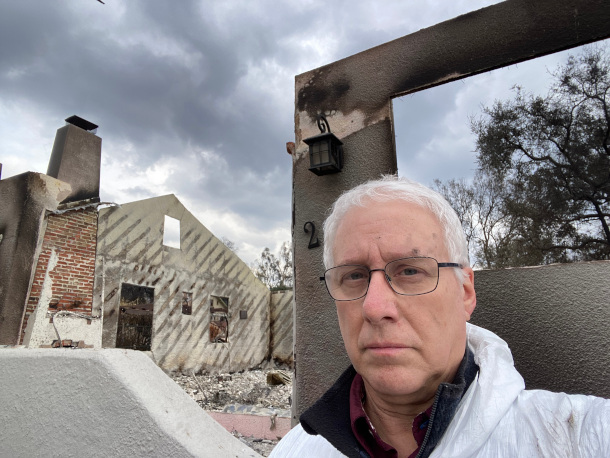
David Brancaccio, “Marketplace Morning Report” Host and Senior Editor, lost his Altadena home in the January 2025 Eaton fires, just two months after purchasing it. (Photo: David Brancaccio)
The thousands of homes that burned in Los Angeles this January included the home of Marketplace Morning Report Host David Brancaccio. David joined Living on Earth Host Steve Curwood to share what he’s learning about the challenges of rebuilding with a limited supply and huge demand for contractors.
Transcript
BELTRAN: The Los Angeles fires this January ravaged entire neighborhoods, reducing thousands of homes to ashes. And one of those homes belonged to David Brancaccio.
David has worked in public radio and television for decades, but you likely know him as the Host and Senior Editor of Marketplace Morning Report. David and his wife Mary, the poet and former teacher and journalist, had bought their Altadena, California house just two months before it went up in flames. David Brancaccio shared what he’s learning from his brush with the climate crisis with Living on Earth Host Steve Curwood.
CURWOOD: So there you are in this house you just acquired, just started to move into, and the fire happens. What was it like to walk through the rubble of your neighborhood and your home the first time when you saw it after this fire? What did it feel like?
BRANCACCIO: Over the years, I've covered all sorts of disasters, but with my work in journalism, you go in, you try to do good work by lifting up people's stories. You hope it makes lives better, and then you leave. This is the story that I can't leave. I've seen so much in my career, I had covered an earthquake in Turkey in which 30,000 people died, but I was not prepared for the violence of the fire. There's so little left. When you go back to just my linear street, one house is okay, according to the fire department, eight houses can be repaired. Steve, twenty one houses just on that block are completely destroyed. They just have, like, the chimney sticking up there. The outline of the house was mainly what you would see at the bottom of a campfire the day after: light, fluffy ash, little nuggets, marshmallow-sized char, and almost nothing else. I guess one of the things that you did see that illustrated the violence of this conflagration was the house came with two front loading, a washer and a dryer. They were kicked back on their backs, nearly unrecognizable, facing up to the sky. I'm like, what exactly happened here? And I did find something. I was doing a piece about climate change for PBS television some years ago, and we climbed to the mouth of the Ganges River in the Himalaya. And if you take some of the water from where it shoots out of the glacier, it's said to be sacred, and pilgrims do this. So of course, I had to do this, and I collected it in this little copper flask, a little vessel. And we've had it in the house in the east for years. We brought it out when we moved in in California, and Mary Brancaccio used it to sprinkle on the interior of the house as a kind of blessing. And on a third check, I found its remains, charred, but in the right shape, missing a little piece, certainly, the water had evaporated, but it was nice to collect that little object. It meant a lot to us. By the way, Steve, here's what Mary asked for in this blessing in November. She asked for those living within these walls to be protected. That worked. At the time of the fire itself, we were back east packing the rest of the stuff, so physically, we're fine. Didn't have to go through the trauma of the raining embers, being evacuated in the middle of the night. So it was some days afterwards when we went out to the site and I, I asked Mary if I could record for radio that moment.
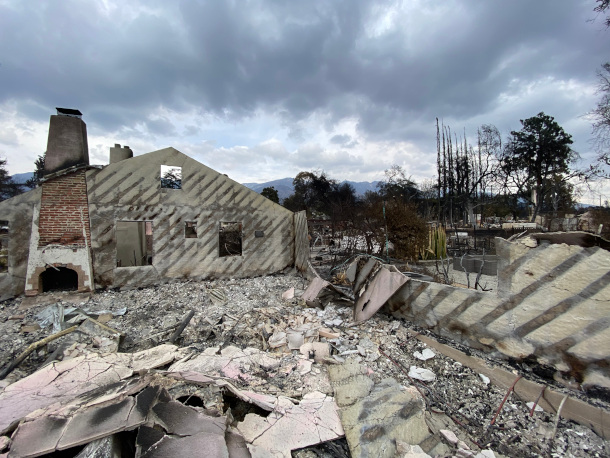
The burned-out Brancaccio home in Altadena. “I’ve seen so much in my career, but I was not prepared for the violence of the fire,” David says. Twenty one houses on his linear street were completely destroyed. (Photo: David Brancaccio)
MARY BRANCACCIO: I look around, and now all I see is all the hard work it's going to take to bring it back, and I'm wondering if I still have it in me to do it, if I'm still young enough to do it.
DAVID BRANCACCIO: And we're in our mid 60s, and we both have a lot of energy, and she's collected more energy since that bad moment, but it's a whole, full time job now.
CURWOOD: So talk to me about the extent that you've seen your neighbors coming together in the wake of this disaster. What's the atmosphere been like in your community?
BRANCACCIO: It's very interesting. Lots of signs up saying, "Altadena is not for sale." And it's an organizing principle to get people together, and that is code for something important, which is, if you can't figure out how you're going to rent because your house was destroyed, you are going to be open to predatory developers who come by right after the fire and offer you less than what your property will be worth, just so you can have some cash flow and survive. And there's a community wide discussion about making resources available so that people can resist that. And I don't know about you, do you have one of those, like WhatsApp list serves for your neighborhood, where neighbors say, trash pickup is actually going to be moved by a day because of the storm? I don’t know if you have one of those.
CURWOOD: Yes, yes.
BRANCACCIO: The version of this that we have up in Altadena has been exchanging crucial information, loads of stuff that even I with the access to information that I get as a reporter, have not seen. And it's, you know, at a time when technology can be so corrosive in its effect, sometimes this stuff actually is getting people timely information that they can act on. So I have to say that I know an order of magnitude more people, members of the Altadena community, two and a half months into our tenure than I would have had there not been a disaster. I mean, if I'd had it to do over again, I certainly wouldn't choose disaster, but it's been one of the weird corollaries of this, is the human connections that this can bring about.
CURWOOD: What are the challenges that families in the neighborhood of Altadena are facing, and what do they need to do to move forward? And maybe you could start with, what do you do with your kids in school?
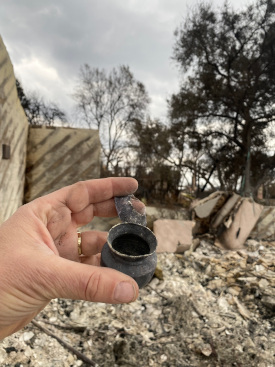
After multiple searches, David finally found the remains of a copper flask that had contained sacred water from the Ganges River. (Photo: David Brancaccio)
BRANCACCIO: Yeah, it's hard, and some kids have merged into other schools. So there are these big class sizes placed into auditoriums in some areas. It's a hard time for people with kids in school. That's one of the big challenges. The set of challenges that we're facing on our end have a lot to do with supply chains and logistics. When just in my fire, 9000 structures are burned, where are we going to find a contractor? I heard from a seasoned contractor a dirty secret about that line of work. Many contractors are really good at building you a new den or a deck or a kitchen, but don't have experience building from the ground up. So that's then a much smaller subset of available contractors. Well, import some contractors, you know? Well, are they aware of the nuances of the building codes in your area? One of the first things I did after finding that our house was destroyed was reach out to someone who had lost their house in a wildfire in 2008 out in Santa Barbara. And I called this guy, Jeff, and he told some hair-raising stories of friends of his who contracted with out of state builders who turned out to be charlatans. And I said, did not get their houses built? He said, not only that, one of those contractors is in jail, right? So you have to be very, very careful. Next problem: with the possibility of higher tariffs, a lot of the wall board for rebuilding comes in from Mexico. A lot of the soft lumber comes from Canada. Now, as we're talking, those higher tariffs have been delayed by a few weeks, and a further issue is the labor. Where is the labor coming in this environment? On any project that I would be party to, we would not have undocumented workers working for us, but with more people not coming in or being ushered out because of a hardened border, there will be upward pressure on the labor market. It will get more expensive to hire those who remain. It's a very complicated time to be rebuilding.
[MUSIC: Seidler and Reinmar Jacqueline Schwab, “The Invitation” on Traditional Scottish Music, by Peter Barnes, Personal copy of unpublished material]
BELTRAN: That’s Marketplace Morning Report Host David Brancaccio, speaking with Living on Earth Host Steve Curwood. And we’ll be back in a moment with more of their conversation, including the importance of rebuilding the community. Stay tuned to Living on Earth.
ANNOUNCER: Support for Living on Earth comes from Friends of Smeagull the Seagull and Smeagull’s Guide to Wildlife. It’s all about the wildlife right next door to you! That’s Smeagull, S - M - E - A - G - U - L - L, SmeagullGuide.org.
[CUTAWAY MUSIC: Simone Dinnerstein, “Goldberg Variarions, BWV 988 Canone al’Unisono” on Simone Dinnerstein-piano by Johann Sebastian Bach, Telarc Records]
BELTRAN: It’s Living on Earth, I’m Paloma Beltran.
DOERING: And I’m Jenni Doering. We’re back now with more from Host Steve Curwood’s interview with David Brancaccio, the Marketplace Morning Report Host who lost his home in the Los Angeles wildfires this January.
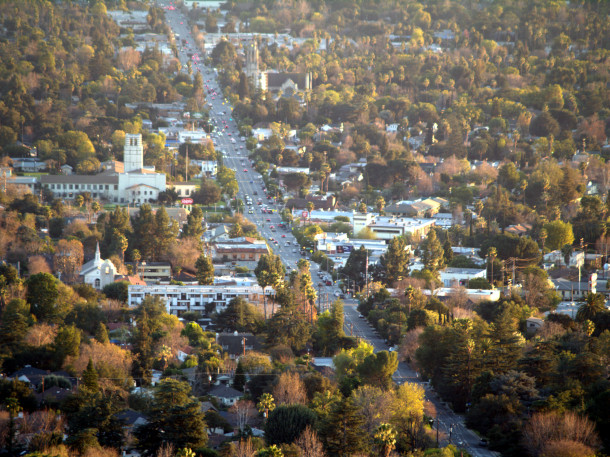
The diverse community of Altadena, California, was not subject to the redlining of nearby areas. (Photo: Weedwhacker128, Wikimedia Commons, CC0)
CURWOOD: David as I understand it, a number of insurance companies have withdrawn from or reduced their exposure to offering coverage in California. In fact, most policies are written by a system that the state helps to administer with private companies. How is the difficulty of getting insurance influencing residents' decisions to either move on or rebuild?
BRANCACCIO: I was corresponding with someone else in Altadena who says they can't expect me to rebuild if I don't know if I can get insurance in the future. It's not clear if we can get insurance, and I can't invest so much of my resources, I mean, I, like everybody else, the biggest asset we have is the house, if it's going to be uninsured. I think there's going to be a public policy response to this. Some people have talked about Medicare for all, but for insurance. California has a bit of that already with their California FAIR Plan, the insurance policy of last resort that actually I had already, but there may be that the private insurance market on its own would refuse to underwrite in this area. And if you don't believe Dave Brancaccio, how about believing Jerome Powell, the Chair of the Federal Reserve, arguably the most important economic policymaker in the country. During testimony on Capitol Hill, he was asked about this, and he said, if there isn't changes to the way we do insurance in America, there will be sections of America where you can no longer build houses because they will be uninsurable in the face of changes in climate. It's going to be a major public policy issue, certainly not just in California, places where there are tornadoes, places where there's gonna be floods or other storms. My heart goes out to a next category of people. Let's say you inherited the house, or you paid off your mortgage. You're lucky enough to have lived in the house long enough you paid it off, you owned it outright. You might not have had insurance if you didn't have to have insurance, and then you're completely out of luck, with an interesting exception, with the fire in question on our side of town. We do not know what caused that fire. I'm saying that clearly. The cause has not been determined, but there is emerging evidence that possibly the electric power companies' high tension power lines over the mountains behind Altadena, may have created a spark that started this. And if that turns out to be true, and we shall see, we don't know, that means that people who don't have insurance would be able to sue. And the way it works in California is one of the utilities went out of business after a wildfire, so there's essentially a kind of slush fund to keep the utilities in business, should wildfire lead to lawsuits. So that will take years, and the outcomes are uncertain. Lawyers will tell you it's not that uncertain, given the way of the universe and the chaos that we've seen around us recently, who knows.
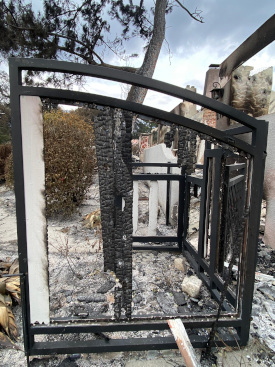
When first visiting the destruction, Mary Brancaccio, David’s wife, wondered if she’s “still young enough” to handle the work it will take to rebuild. (Photo: David Brancaccio)
CURWOOD: Don't hold your breath.
BRANCACCIO: Yeah, don't hold your breath. But it could make someone whole, but you know, in Star Date 2173.4, as Captain Kirk would say. We'll see. But if you were under-insured or not insured, it's extremely hard, because what's the first thing you got to do? You got to live somewhere.
CURWOOD: And don't you have to keep paying your mortgage even though the building is gone?
BRANCACCIO: Yeah, you do. I didn't know that, Mr. Big Shot Business Reporter here. I felt that the way the world works is that, of course, I would have to keep paying. Yes, you do. The other thing I've learned, had no idea about is that if your insurance company does send you a check and you have a mortgage and you have a loan, it's written out to Steve Curwood, and your mortgage lender. Both have to sign. So actually, the check really goes to the mortgage lender, and then the bank gives you your money in little drips and drabs as you rebuild. You don't have full control over the money. Part B, they hardly have to pay you any interest on it. And think about it, like if you had a fancy house or just a middle class house, what if that check is $800,000? What if they hold it for a year or two? It's like lots of money you could be earning on it.
CURWOOD: David, you've covered climate disruption for a long time. How did your awareness of climate and the danger of fires in California impact your decision to move to Altadena and buy a house there?
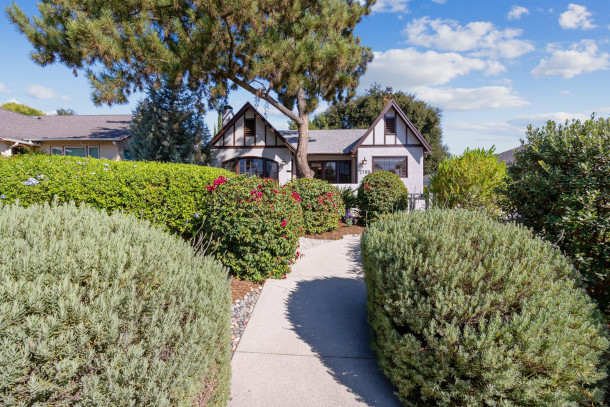
The Brancaccio’s home before the fire. (Photo: David Brancaccio)
BRANCACCIO: Exactly. Having not just fallen off the turnip truck when it comes to these issues of wildfires and climate change, it was front of mind. I looked at every fire map I could find, and we ruled out large swaths of California because of fire risk. By the way, why even moved to California? Two of our three children are out there. And I'm very happy to report that my son and his partner just had a baby boy the other day. So we want to be closer with family, we think, I think is a reasonable motivation for wanting to move, but not into a fire zone. So if, my insurance policy rates my house on a scale of one to ten for fire risk, ten being don't even think about it, we're only a four. Wasn't up in the canyon. It wasn't surrounded by California chaparral. In fact, its gardens were drought tolerant, and they had the buffer that people talk about that are important when thinking about wildfire risk. Yet this was this event that was unprecedented in so many ways. When the winds started gusting 60, 70, 80, perhaps 100 miles an hour, these Santa Ana winds, they move that fire in a way that we haven't seen into a not rural, suburban area with regular houses on a suburban street. It's a reminder that we all may be vulnerable at some level to some kind of climate disruption.
CURWOOD: So you moved to this place in California, in greater LA, understanding that there's a risk from climate disruption, but the sort of impossible happens. How do you feel about rebuilding, though, especially since climate disruption isn't static, but it's getting slowly worse and worse, the so-called whiplash phenomenon, for example, that is increasing the heavy rains and the droughts because of the thermodynamics of the way the atmosphere works. So how are you feeling about the question of rebuilding there versus, you know what? This didn't really work out so well. Maybe there's a better place.
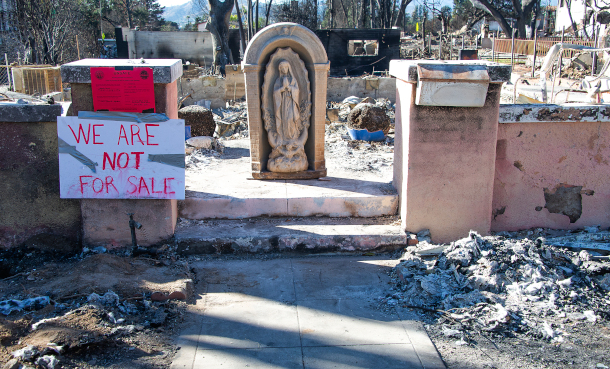
As Altadena residents scramble for security, many are vulnerable to predatory developers offering to buy their property at very low prices. (Photo: Russ Allison Loar, Flickr, CC BY-NC-ND 2.0)
BRANCACCIO: Well, I mean, I'm not going to, the guy who covers money and finance for public radio is not going to declare personal bankruptcy. I don't have a huge choice. But this is something that I think everybody is wrestling with, given the heartache and the costs and difficulty of rebuilding, and lightning can strike twice, but I think the most serious way to answer your question is this, I need to balance the risk of rebuilding in an area that's been shown to be vulnerable with doing what I can to see that the community that was lost in this fire has a chance of being rebuilt. Now, whether or not David Brancaccio lives there or not is not going to make or break the community, but if a lot of people leave, you're going to have I don't know what left in this town, and it's a town that deserves to be taken seriously. It is a town that, on my side of town, didn't have the red lining that was prominent in adjacent communities, that kept out people of color, so that a lot of people from diverse backgrounds have built generational wealth there over years. It's also a kind of funky community, it was. Some people described it as bohemian. And there's rebuilding houses, but there's also rebuilding community. So what's happening there is we're starting to see the seeds of a really interesting conversation in which people are coming together and asking the question, what kind of community do we want to be? What were the parts of what we lost that we want to preserve? What community institutions do we want to support? And that is something that I've been lecturing on for many decades. It's called social capital. It's this resource that is worth real money. But come back around to really what you asked is like, why are you rebuilding out in California? I just don't know exactly where I'm supposed to go to hide from climate change. My wife's family has a house on a barrier island in North Carolina. Gee, that doesn't seem like such a great long-term bet at some level. Maine, my hometown of Waterville, had two outrageous floods last year. You know, it's everywhere.
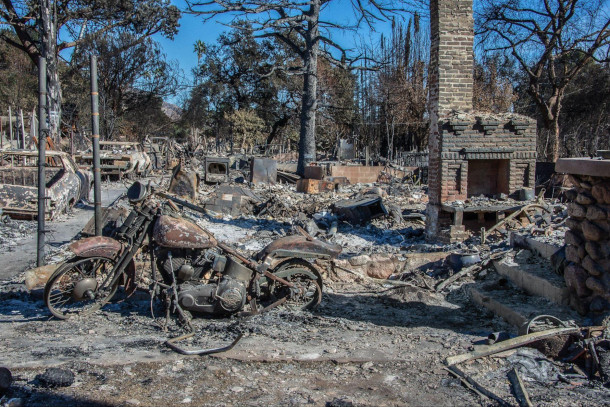
Fire damage in Altadena. Some insurance companies have withdrawn from or reduced their coverage in parts of California, leaving many residents reluctant to rebuild. (Photo: Russ Allison Loar, Flickr, CC BY-NC-ND 2.0)
CURWOOD: So David, how might we think differently about climate risks and sustainability in your neighborhood when it rises from the ashes, so to speak? What do you envision? What do you hope for there?
BRANCACCIO: I think that Altadena, California could become a model community that people could look to, look what they did there, look how they saw the existential threat of another fire in the future and responded with new ways of living. And that same conversation in which people have decided we're not just going to rebuild, we're going to talk about what we want to rebuild together, we can do some hardening of infrastructure to try to mitigate the possibilities that this would happen again. So what are the rules about the buffers between the mountains and the first houses? If it's determined that the high-tension power lines caused this, shouldn't they be buried underground? It's expensive. It's not something the utility would like to do. They would only do it under pressure. So maybe the community comes together to demand that those things are underground and that whatever happens in the future, that doesn't happen again. By the way, in our case, the house may look at some level, have the same vibe, is our current thinking. I mean, I'm not going to, Mary and I are not going to build what looks like a defensive position on the shores of Normandy. We want it to evoke the cottagey thing that we had before, but we're not going to build with the same techniques. We're going to have to spend extra to for instance, whatever the outside is, it's made out of concrete. There's stuff that looks just like siding or regular stucco that's concrete, more resistant to fire. House was 99 years old, single pane windows. Very vulnerable to if there was fire next door. Double gives you more time. A big thing is vents suck in burning embers and are a real hazard. So we have to rethink all that space to either have fancy vents that don't suck in embers or not have vents. So 100-year-old house versus one built in 2026 and 2027 has access to lots of new technology that we didn't have before. I mean, you know, heat pumps, hot water heaters that are also heat pumps, certainly solar cells on the roof. There's just a lot more we can do. Now, that slows things down a little bit, when you take a moment to breathe and to think about, wait, don't just take the footprint of your house that burned and just redo the whole thing the same way. And there is a understandable need for people to get back some of the security they've lost. So those two things are in tension.
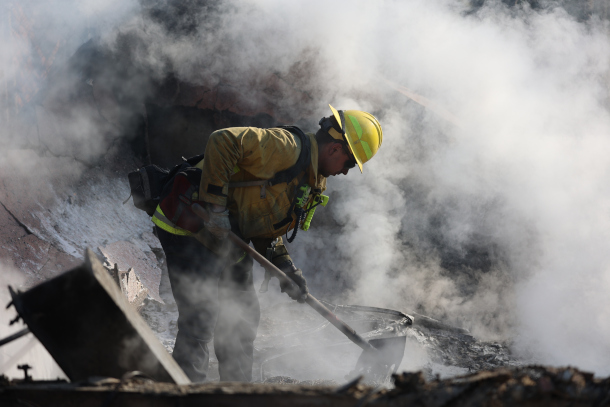
GDP can temporarily rise in the aftermath of a disaster, due to the economic activities associated with rebuilding. However, some economists argue that this highlights the flaws in that economic metric. (Photo: CAL FIRE_Official, Flickr, CC BY-NC 2.0)
CURWOOD: What do you think is the overall economic impact of these mega fires in the Los Angeles Basin? What has happened to the economy of California, or at least that part of California?
BRANCACCIO: It's this great perverse feature of disasters. One of the things I've covered a lot over the years is that economic growth, gross domestic product, rewards bad things as much as it rewards good things. I made a documentary film some years ago in which a little piece of it was, if I bicycled over to a farmer's market to buy an apple, it wouldn't do much for GDP, gross domestic product, but if I were to put gas in my fuel sucking car and crash on the way over to buy an apple at the supermarket that had imported it from New Zealand, the apple, I would be doing wonderful things for GDP, because there's a lot of economic activity in that. Disasters cause temporary blips upward in economic growth, because you have to, the economic activity of rebuilding. That's the problem with our traditional measures, right, Steve? They don't measure the anguish that a disaster like this causes. There should be a debit column for some of this. I did just talk to an expert at Middlebury College, an economist who did a study, and disasters depress job creation for three whole years after a disaster. But the asterisk is this, if the disaster is designated a federal disaster, with all the subsidies that come in, it doesn't depress job creation. So the federal aid that can go into an area after the really big disasters, the federal money offsets the effect, which is one of the reasons that we have those systems like FEMA, and one of the reasons we're watching so carefully talk coming out of Washington now of modifying, altering or eliminating FEMA.
CURWOOD: What you've been through, David, it's really rough, although you point out that other people have had it even rougher in this massive series of wildfires there in the Los Angeles area. And yet, when these sorts of things happen, hope can emerge. How has it emerged for you in this case?
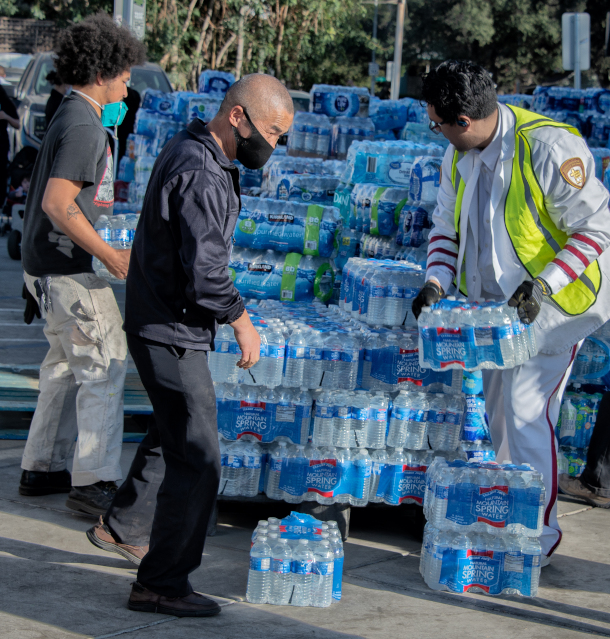
David says he’s seen many Altadena neighbors come together in the wake of the fire. (Photo: Russ Allison Loar, Flickr. CC BY-NC-ND 2.0)
BRANCACCIO: Well, it was, I gotta say, funny. When I called a fellow who had lost his house in a wildfire in California in 2008, first thing he said was, it was the best thing that ever happened to me. And I was not that far down the curve three days after the loss of my house to fully appreciate what he was trying to say. In his case, he felt a lot lighter when he lost all his worldly possessions. And the problem in my case is we were already casting off stuff. We were recycling as much as possible before we ever knew a fire was going to happen ahead of the rest of our move. And so I didn't need that lesson, but I got to say that you play the hand that you're dealt. And I find myself living in a completely different part of Los Angeles now, in a rental, signed up for a year, could stretch to a couple years as we rebuild, and unexpectedly, I'm near West Adams, which is an interesting neighborhood, near USC, I am near Koreatown, a fascinating neighborhood that's almost like being near Brooklyn, New York. And there's a rich diversity there that is opening our eyes to another way of living. And already, if I just counted it up, the number of human interactions, making friends, meeting people we wouldn't have is off the charts greater than had I just moved into the house, as I did in November, kept my head low and maybe met the neighbor next door.
CURWOOD: In other words, it's people, not stuff.
BRANCACCIO: It is definitely people.
DOERING: That’s Marketplace Morning Report Host David Brancaccio, speaking with Living on Earth Host Steve Curwood.
Links
Marketplace | “Marketplace’s David Brancaccio on Community, Loss and Rebuilding in Altadena”
Reuters | “Exposed Utility Wires May Have Contributed to LA’s Eaton Fire, Law Firm Says”
Living on Earth wants to hear from you!
Living on Earth
62 Calef Highway, Suite 212
Lee, NH 03861
Telephone: 617-287-4121
E-mail: comments@loe.org
Newsletter [Click here]
Donate to Living on Earth!
Living on Earth is an independent media program and relies entirely on contributions from listeners and institutions supporting public service. Please donate now to preserve an independent environmental voice.
NewsletterLiving on Earth offers a weekly delivery of the show's rundown to your mailbox. Sign up for our newsletter today!
 Sailors For The Sea: Be the change you want to sea.
Sailors For The Sea: Be the change you want to sea.
 The Grantham Foundation for the Protection of the Environment: Committed to protecting and improving the health of the global environment.
The Grantham Foundation for the Protection of the Environment: Committed to protecting and improving the health of the global environment.
 Contribute to Living on Earth and receive, as our gift to you, an archival print of one of Mark Seth Lender's extraordinary wildlife photographs. Follow the link to see Mark's current collection of photographs.
Contribute to Living on Earth and receive, as our gift to you, an archival print of one of Mark Seth Lender's extraordinary wildlife photographs. Follow the link to see Mark's current collection of photographs.
 Buy a signed copy of Mark Seth Lender's book Smeagull the Seagull & support Living on Earth
Buy a signed copy of Mark Seth Lender's book Smeagull the Seagull & support Living on Earth

